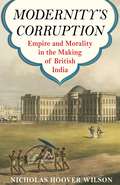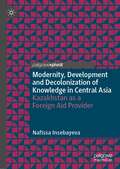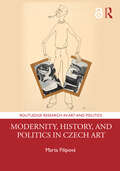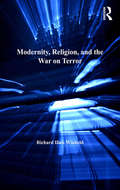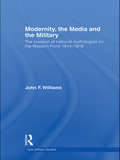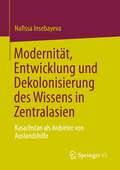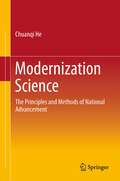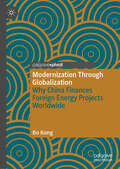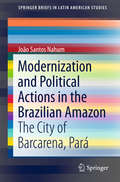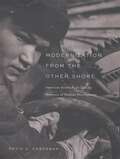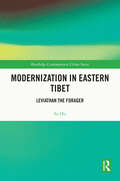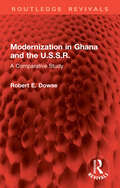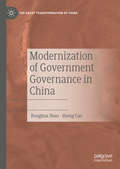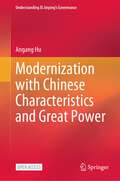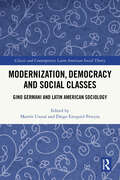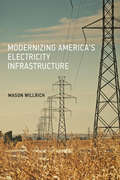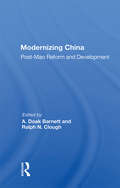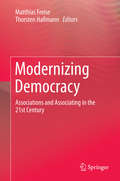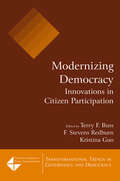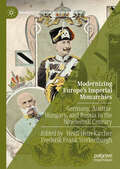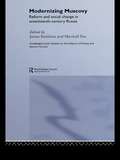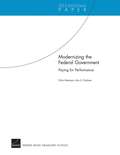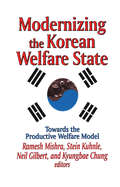- Table View
- List View
Modernity's Corruption: Empire and Morality in the Making of British India
by Nicholas Hoover WilsonToday, “corruption” generally refers to pursuing personal interests at the expense of one’s responsibilities, the law, or the common good. It calls to mind some official violating their public duty for private gain, suggesting seamy bureaucracies taking payoffs, kickbacks, and bribes. Yet at other times, notions of corruption were rooted in a more expansive view of the causes of people’s behavior and the appropriate ways to regulate conduct. In this understanding, to be “corrupt” meant losing a delicate balance among competing appetites under specific circumstances and in the eyes of peers. Why did a narrower definition of corruption become dominant?Nicholas Hoover Wilson develops a new account of the changing category of corruption by examining the English East India Company and its transformation from a largely commercial enterprise to a militarized offshoot of British empire in the eighteenth and nineteenth centuries. He argues that the modern idea of corruption arose as an unintended consequence of conflicts among company officials and the changing audiences to which they justified themselves in Britain. This new understanding unified an imperial elite at risk of fragmenting into irreconcilable moral worlds and, in the process, helped redefine the boundaries of state, society, and economy. Modernity’s Corruption is at once a novel historical sociology of imperial administration and its contradictions, a fresh argument about the nature of corruption and its political and organizational effects, and a reinvigoration of classic arguments about the nature and consequences of global modernity.
Modernity, Development and Decolonization of Knowledge in Central Asia: Kazakhstan as a Foreign Aid Provider (Politics and History in Central Asia)
by Nafissa InsebayevaThis book joins the discussion on foreign aid triggered by the rise of multiplicity of emerging donors in international development and explores the transformation of Kazakhstan from a recipient country to a development aid provider. Drawing on fieldwork in Nur-Sultan and Almaty (Kazakhstan) between 2016 and 2019, this research evaluates the philosophy and core features of Kazakhstan’s chosen development aid model and explains the factors that account for the construction of aid patterns of Kazakh donorship. This book will be of interest to scholars of Central Asia and the emerging politics of Eurasia as well as scholars of politics and aid.
Modernity, History, and Politics in Czech Art (Routledge Research in Art and Politics)
by Marta FilipováThis book traces the influence of the changing political environment on Czech art, criticism, history, and theory between 1895 and 1939, looking beyond the avant-garde to the peripheries of modern art. The period is marked by radical political changes, the formation of national and regional identities, and the rise of modernism in Central Europe – specifically, the collapse of Austria-Hungary and the creation of the new democratic state of Czechoslovakia. Marta Filipová studies the way in which narratives of modern art were formed in a constant negotiation and dialogue between an effort to be international and a desire to remain authentically local.
Modernity, Religion, and the War on Terror
by Richard Dien WinfieldThe war on terror cannot be truly understood without investigating the legitimacy of modernity, the challenge that religion presents to modernization, the inescapable conflicts attending the emergence and expansion of modernity, and the post-colonial predicament from which Islamist reaction arises. Richard Dien Winfield illuminates the war on terror in light of these issues, presenting an anti-foundationalist justification of the rationality and freedom of modernity, while assessing how religion can stand in opposition to modernity and why Islam has been a privileged vehicle of anti-modern religious revolt. Winfield shows that the privatization that religion must undergo to be compatible with modern freedom involves no capitulation to relativism, but rather is a theological imperative on which the truth of religion depends. Exposing the limits of any purely secular modernization of Islam, Winfield shows how Islam can draw upon its core tradition to repudiate the oppression of Islamist reaction and become at home in the modern world.
Modernity, the Media and the Military: The Creation of National Mythologies on the Western Front 1914-1918 (Cass Military Studies)
by John F. WilliamsThis new volume explores the history of an important, but neglected sector of the Western Front between 1914 and 1918 in the context of its portrayal in the media. The analysis sheds new light on of the role of the mass media in generating national mythologies. The book focuses on the largely forgotten Armentières and La Bassée sector, a section of the Western Front which saw fighting from many different nationalities on almost every day of the war. Through analysis of this section of the Western Front, this book examines the way the First World War was interpreted, both in official and semi-official sources as well as in the mass media, comparing what was apparently happening on the Western Front battlefield to what was reported in the newspapers. It follows the different sides as they responded to the changing nature of warfare and to each other, showing how reporting was adapted to changing perceptions of national needs.
Modernität, Entwicklung und Dekolonisierung des Wissens in Zentralasien: Kasachstan als Anbieter von Auslandshilfe
by Nafissa InsebayevaDieses Buch fügt sich in die Diskussion über die Auslandshilfe ein, die durch das Aufkommen einer Vielzahl neuer Geber im Bereich der internationalen Entwicklung ausgelöst wurde, und untersucht den Wandel Kasachstans von einem Empfängerland zu einem Entwicklungshilfegeber. Auf der Grundlage von Feldforschungen in Nur-Sultan und Almaty (Kasachstan) zwischen 2016 und 2019 bewertet diese Untersuchung die Philosophie und die Kernmerkmale des von Kasachstan gewählten Entwicklungshilfemodells und erklärt die Faktoren, die für die Konstruktion der Hilfemuster der kasachischen Geberschaft verantwortlich sind. Das Buch ist von Interesse für Wissenschaftler, die sich mit Zentralasien und der aufstrebenden Politik Eurasiens befassen, sowie für Wissenschaftler, die sich mit Politik und Entwicklungshilfe befassen.
Modernité en transit - Modernity in Transit (Cultural Transfers)
by Dubé, Richard; Gin, Pascal; Moser, Walter; Pires, AlvaroEn 1979, Jean-François Lyotard a articulé la condition postmoderne, annonçant la fin de la modernité. Mais la modernité nous tient encore et se réinvente dans des nouvelles périodisations. Il nous incombe de reprendre la réflexion sur ce paradigme à la fois historique, culturel et social, et ceci, à partir de notre condition de « puînés » de la modernité. Tel est le programme de réflexion de cet ouvrage collectif qui privilégie une approche interdisciplinaire et internationale.
Modernization Science: The Principles and Methods of National Advancement
by Chuanqi HeDepending on their national level of income, development and modernization, all countries in the world can be generally categorized as either advanced or developing. Studies on why advanced countries continue to develop, how they maintain their level of development, and how developing countries enter into the advanced club fall into the field of "modernization science," which is an emerging interdisciplinary science. This monograph, the first English book available on "modernization science," interprets its concepts, methodologies, general theories, first and second modernization, six level-specific, six field-specific and three sector-specific modernizations, modernization policy and evaluation, and the principles and methods of national development since the 18th century. It provides clear, systematic, up-to-date information on this new discipline with more than 173 figures and 265 tables, and covers 131 countries and 97% of the global population. A comprehensive outlook on world modernization is presented from a Chinese perspective.
Modernization Through Globalization: Why China Finances Foreign Energy Projects Worldwide
by Bo KongThis pivot considers how China deals with the globalization of its energy companies in the face of global efforts to combat climate change. It examines how China, following its emergence as the world’s largest energy consumer and its resultant growing dependence on foreign energy, engages the world on energy, and its implications for global governance of energy. It notably focuses on the policy impact of China’s global engagement for the accelerated “going out” strategy and the so-called “one belt one road” (OBOR) initiative, and profound climate implications for the rest of the world, contending that the type of energy services, technologies, and infrastructure China finances around the globe today will determine the global community’s carbon footprint in the foreseeable future.
Modernization and Political Actions in the Brazilian Amazon: The City of Barcarena, Pará (SpringerBriefs in Latin American Studies)
by João Santos NahumThis book offers an analysis of the territory of Barcarena, in the Brazilian Amazon. The author studies the land use and the implemented modernization policies that made it one of the richest cities of the state. The political system uses this territory as a resource to provide for the needs of a small circle of social agents. A system of conservative political actions enforces the process of modernization of the Baracena territory. Innovations in the Barcarena territory, such as the implementation of the aluminium factory Albras/Alunorte and the territorial configuration or public administration, lead to modernization simulations and artificial devices. The intended effect however is more about appearing to be modern, than actual modernization. The territorial use of Barcarena is aimed to protect the interests and privileges of the elite.
Modernization from the Other Shore: American Intellectuals and the Romance of Russian Development (Emersion: Emergent Village Resources For Communities Of Faith Ser.)
by David C. EngermanFrom the late nineteenth century to the eve of World War II, America's experts on Russia watched as Russia and the Soviet Union embarked on a course of rapid industrialization. Captivated by the idea of modernization, diplomats, journalists, and scholars across the political spectrum rationalized the enormous human cost of this path to progress. In a fascinating examination of this crucial era, David Engerman underscores the key role economic development played in America's understanding of Russia and explores its profound effects on U.S. policy.American intellectuals from George Kennan to Samuel Harper to Calvin Hoover understood Russian events in terms of national character. Many of them used stereotypes of Russian passivity, backwardness, and fatalism to explain the need for--and the costs of--Soviet economic development. These costs included devastating famines that left millions starving while the government still exported grain.This book is a stellar example of the new international history that seamlessly blends cultural and intellectual currents with policymaking and foreign relations. It offers valuable insights into the role of cultural differences and the shaping of economic policy for developing nations even today.
Modernization in Eastern Tibet: Leviathan the Forager (ISSN)
by Su HuUsing ethnographic materials and documents from East Tibetan villages, this book addresses the impact of modernization on everyday life and the ways in which it melds with traditional forms of knowledge to create a new Tibetan identity and scientific rationality.Including cases centred on meteorology, geography, and seismology, the book assesses a wide range of traditional local activities, including foraging, farming, and domestic practices, and argues that and demonstrates how science, technology, and ideas about modernity have all influenced these activities. It highlights that when inconsistencies among different knowledges emerge, modernization can create inconsistent assemblages of modern and traditional practices and reveal the multiplicity of everyday life.Using these examples of everyday life to portray the complexity of day-to-day existence in Tibet, this book will be of huge interest to students and scholars of Tibet, China, human geography, anthropology, and the sociology of science and technology.
Modernization in Ghana and the U.S.S.R.: A Comparative Study (Routledge Revivals)
by Robert E. DowseFirst published in 1969, Modernization in Ghana and the U.S.S.R. examines the aspects of politics of modernization in two states—the U.S.S.R. and Ghana. One of the major contentions of the volume is that they faced a variety of similar problems and their responses to these had a great deal in common. The most obvious similarity between the two was the single-party state with a relatively high degree of control exercised by the party leadership over the party. There are also many similarities concerning attitudes to economic development and the outside world.The problem that most concerned the new leaders of Ghana and Russia was that of economic development. Political priorities were assessed in the light or by the standard of systems of ideas, of ideologies. The overall thesis of the book is that although Marxism-Leninism and Nkrumaism differ greatly, the leaders of the two countries in fact behaved in a remarkably similar fashion, and the author shows that their responses had as much to do with similar problems as with ideological patterns. This book is a must read for students and researchers of comparative politics.
Modernization of Government Governance in China (The Great Transformation of China)
by Ronghua Shen Sheng CaoThis book provides an all-round analysis and exploration of the course, status quo and future of the Chinese Government's governance reform under the framework of government governance modernization. The authors bring their decades of experience in crafting policy in China to explain the relationship between China's government and market, between government and society, between the central government and local governments, functional transformation, organizational structure optimization, reform of public institutions, allocation of fiscally supported personnel, the building of a law-based government and other major issues, while also laying out a case for structural changes in the years to come.
Modernization with Chinese Characteristics and Great Power (Understanding Xi Jinping’s Governance)
by Angang HuThis open access book expounds in detail on the profound meaning and main characteristics of modernization with Chinese characteristics. This was done utilizing tools of historical investigation and fact-based research on the modernization of New China. The author provides a far-reaching outlook of the strategic goals and future trends of modernization with Chinese characteristics. In this book, the author answers the questions: What is modernization with Chinese characteristics? How did this modernization develop, and what are its main features? In what direction will it develop in the future? Why did China propose to basically realize the goal of socialist modernization by 2035? How can China achieve this ambitious goal on schedule? What major impact will this modernization have on China and the world? This book adheres to the concept of "knowledge for the people, knowledge for the country, and knowledge for mankind." It actively explores and summarizes the laws of modernization with Chinese characteristics and fully elucidates its characteristics. This book not only provides decision-makers with a basis for understanding national conditions and their national policy research, but also serves as an important reference for party members, cadres, and readers to understand the path of modernization with Chinese characteristics.
Modernization, Cultural Change, and Democracy
by Ronald Inglehart Christian WelzelThis book demonstrates that people's basic values and beliefs are changing, in ways that affect their political, sexual, economic, and religious behaviour. These changes are roughly predictable: to a large extent, they can be interpreted on the basis of a revised version of modernisation theory presented here. Drawing on a massive body of evidence from societies containing 85 percent of the world's population, the authors demonstrate that modernisation is a process of human development, in which economic development gives rise to cultural changes that make individual autonomy, gender equality, and democracy increasingly likely. The authors present a model of social change that predicts how the value systems play a crucial role in the emergence and flourishing of democratic institutions - and that modernisation brings coherent cultural changes that are conducive to democratisation.
Modernization, Democracy and Social Classes: Gino Germani and Latin American Sociology (Classic and Contemporary Latin American Social Theory)
by Martín Unzué Diego Ezequiel PereyraGino Germani’s intellectual itinerary is a key step in the understanding of sociology in Latin America. Offering a fresh perspective, this book seeks to strengthen a better reflection on the history of sociology and social sciences in the region, through a reconstruction of the content and context of his enormous production and its legacies and legitimacies.The volume argues that Germani made a huge contribution to the development of sociology and social thought not only in Argentina and South America but also throughout Latin America, United States and Italy, with an enriching and original interdisciplinary perspective. It identifies his theoretical and conceptual proposals and empirical approach and discusses the implications of his ideas in different regional, national and local experiences and contexts. In particular, they promote the prospect of comparative studies focused on different areas of the Global South.A vital collection of work on a key thinker in Latin American Sociology for scholars and students of Sociology in the Americas and the Global South.
Modernizing America's Electricity Infrastructure (The\mit Press Ser.)
by Mason WillrichA comprehensive, coherent strategy for modernizing America's electricity infrastructure while ensuring affordable, reliable, secure, and environmentally sustainable electricity services.America's aging electricity infrastructure is deteriorating rapidly even as the need for highly reliable electric service—driven by the explosion of digital technology—continues to rise. Largely missing from national discussions, however, is a coherent, comprehensive national strategy for modernizing this critical infrastructure. Energy expert Mason Willrich presents just such a strategy in this book, connecting the dots across electric utilities, independent suppliers, government bureaucracies, political jurisdictions, and academic disciplines. He explains the need for a coherent approach, offers a framework for analyzing policy options, and proposes a step-by-step strategy for modernizing electrical infrastructure, end-to-end, in a way that ensures the delivery of affordable, reliable, secure, and environmentally sustainable electricity services.Willrich argues that an effective electrical infrastructure modernization strategy must incorporate flexibility, adaptability, and the capacity to coordinate policies at local, state, and federal levels. He reviews the history of America's electrification, from Edison's demonstration of the incandescent light bulb through the recent expansion of wind, solar, and energy efficiency as carbon-free energy resources. He describes the current ownership and operation of the electric industry and the complicated web of federal and state policies that govern it.
Modernizing China: Post-Mao Reform And Development
by A. Doak Barnett Ralph N. CloughSince the death of Mao, China has entered a new period in its development. Turning away from the all-encompassing emphasis on revolutionary struggle and ideological transformation that characterized the last years of the Maoist era, China's leaders under Deng Xiaoping have initiated dramatic new reform and development policies. In original essays, the contributors, all senior specialists on contemporary China, analyze the reasons for the new policies, the nature and impact of the changes now occurring, and the prospects for a continuation of these policies in the future. Specifically, they examine the Chinese polity as a "consultative authoritarian" system, the farreaching changes in China's agriculture, important shifts in foreign economic relations, the gradual modernization policy pursued by its military leaders, the relaxation of controls on cultural life, and the possibility that current social policies may well increase equality rather than inequality in Chinese society. The authors conclude that it is too early to judge the eventual, long-term outcome of current reforms, which they believe grew out of the political crises and chronic economic problems that afflicted China in the late 1960s and early 1970s. Although they see some opposition and built-in limits to reform, on balance they foresee strong support for continued reform and believe it will be difficult for future leaders to reverse course.
Modernizing Democracy
by Matthias Freise Thorsten HallmannModernizing Democracy brings together scholars focusing the role of associations and associating in contemporary societies. Organizations and associations have been identified as the "meso level of society" and as the "basic elements of democracy". They are important providers of welfare services and play an important role between the individual and political spheres. In recent years the environment of associations and associating has changed dramatically. Individualization, commercialization and globalization are challenging both democracy and the capability of associations to fulfill the functions attributed to them by social sciences. This change provides the central question of the volume: Is being part of an organization or association becoming an outdated model? And do associations still have the capacity of modernizing societies or are they just outdated remnants of post-democracy? The contributions to Modernizing Democracy will be organized into: Studying Association and Associating in the 21st Century, Associating in Times of Post-Democracy and Associations and the Challenge of Capitalist Development. The book will be attractive to third sector researchers as well as a broader academic community of political scientists, sociologists, economists, legal scientists and related disciplines.
Modernizing Democracy: Innovations in Citizen Participation (Transformational Trends In Governance And Democracy Ser.)
by Terry F. Buss F Stevens Redburn Kristina GuoHow do you put the "public" in public management? How can the traditional ethos of professionalism and technical expertise be reconciled with norms of representation and citizen participation at a time when technology is transforming communication between citizens and government - in some ways enhancing the exchange and in other ways complicating it? "Modernizing Democracy: Innovations in Citizen Participation" points the way. Written for public administration professionals, scholars, and students interested in citizen participation, it brings together new analyses of innovative practices, from hands-on community learning and focus groups to high-tech information systems and decision support technologies. The expert contributors illuminate the various roles that public administrators and leaders can play in fostering constructive, meaningful citizen involvement at all stages of the public policy process - from initiation and planning to feedback on public agency performance.
Modernizing Europe’s Imperial Monarchies: Germany, Austria-Hungary, and Russia in the Nineteenth Century (Palgrave Studies in Modern Monarchy)
by Heidi Hein-Kircher Frederik Frank SterkenburghUp until recently, Europe’s three imperial monarchies – the German, Austrian, and Russian Empires – were seen as moribund political entities, unable to accommodate the forces of political, social, economic, and cultural modernization, and as a result collapsed collectively during or shortly after the First World War. More recently, scholars have underlined the viability of these polities, including as frameworks for democratic experiments and fixed points for (supra)national identification, notwithstanding the suppression of minorities and colonial undertakings of these empires. This book takes a different approach: it demonstrates that these three imperial monarchies were capable of and willing to initiate and steer the modernization of their institutions and polities. Rather than understanding modernization as a linear and teleological process, this contributed volume draws instead on Samuel Eisenstadt’s notion of ‘multiple modernities’ to demonstrate how these empires sought to modernize on their own terms. By drawing on this concept, it becomes possible to challenge notions of inevitable decline and instead demonstrate how these imperial monarchies sought to forge modernization on their own terms in the nineteenth and early twentieth century.
Modernizing Muscovy: Reform and Social Change in Seventeenth-Century Russia (Routledge Studies in the History of Russia and Eastern Europe)
by Jarmo Kotilaine Marshall PoeFirst Published in 2004. Routledge is an imprint of Taylor & Francis, an informa company.
Modernizing the Federal Government
by Silvia Montoya John D. GrahamIn 2003, the Volcker Commission recommended that explicit pay-for-performance (PFP) systems be adopted more broadly throughout the federal government. In this occasional paper, the authors compare several proposals aimed at enhancing the role of such PFP schemes for federal civil servants, and examine the pros and cons of PFP schemes compared with seniority-based salary systems, as well as the proposals to change the General Schedule system.
Modernizing the Korean Welfare State: Towards the Productive Welfare Model
by Neil GilbertModernizing the Korean Welfare State analyzes recent developments in social and public policy in South Korea. Its focus is the new approach to Korea's system of social protection, known as the productive welfare paradigm. This volume brings together an international group of scholars to examine the new paradigm and associated policy developments. In the first part, contributors examine the significance of the productive welfare paradigm and recent policy developments within a broader comparative and international perspective. They question the commitment to welfare in the paradigm, viewing it largely as an example of a global trend towards the "enabling state" in which social welfare serves largely economic goals. Other contributors situate the new paradigm in relation to globalization and its implications for national strategies of social protection developed in earlier times. The new departure in Korea is compared to European welfare state development, and contributors find it a bold attempt to fashion a comprehensive welfare state based on social rights. In the second part, contributors focus on specific issues and policy areas. These include the degree to which Korea has been following a "pro-poor" growth policy. They evaluate developments in the area of unemployment and work injury insurance. They review the progress of policies in the area of social insurance and assistance, and the American system of income support for low income earners and its lessons for Korean policymakers. Other contributors review the public pensions system in Korea, and environmental protection policies are discussed and the impact of those policies on the poor and people of color, who are disproportionately exposed to environmental hazards.
